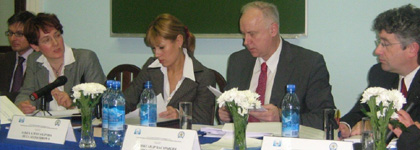
Marin Scheid, lawyer, Susen Wahl, Executive Board ICLS, Olga Alexandrova, Director of Academy of Law in St.-Petersburg, Alexander I. Bastrykin, Doctor of Law, Professor, Chief of the Prosecutor General's Office investigation committee, Hans Born, Chairman Pro NGO! e.V.
| The specific objectives were: | |
| - | to reach the present decision makers of the target countries, and initiate co-operation between them |
| - | to strengthen the basis for networking and co-operation between the countries involved, by training of future decision makers |
| - | to design and implement a training programme to qualify multipliers selected from all target countries |
| - | to support and coach these multipliers to implement seminars, round-tables, lectures and PR-activites in their home countries |
| - | to elaborate specific (and easy to reproduce) training and information material in local languages |
| - | to raise awareness of the ICC among concerned field actors, in particular the armed forces and law-enforcement authorities |
| - | to enhance public perception and awareness of the ICC through local civil society representatives (incl. NGO, universities etc.) and local media |
| - | to accelerate the ratification and implementation process of the Rome Statute |
| - | to support legal experts in drafting implementing legislation, enabling national authorities to try suspects of international crimes before their own courts and ensuring an effective co-operation of national justice systems with the International Criminal Court |
| - | to strengthen the role of the grass roots movement and major parts of the executive branch in promoting human rights and ending impunity for war criminals by assisting the work of the ICC |
To bring key decision-makers together, so-called “High Level Meetings” were organised in the target states to inform about how the ICC works, on the latest ICC developments, and to report to them that the ICC constitutes an international court that functions and most importantly to lay out the necessities for ratification and implementation of the Rome Statute of the ICC into national legislation.
To strengthen the basis for networking and co-operation between the countries involved, future decision makers (junior professionals from ministries and educational institutions) had the opportunity to participate in an ICC research group of the Max Planck Institute in Heidelberg Germany.
For more information see http://www.ngo-at-work.org/icc2006.